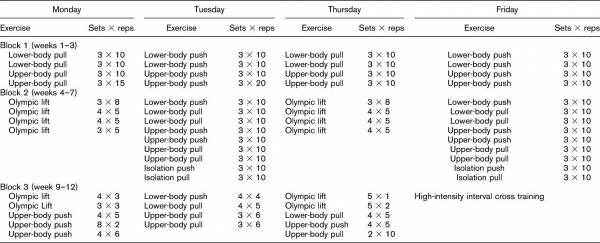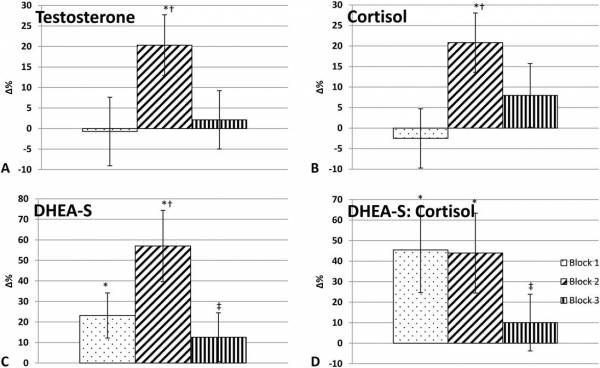We often talk about periodization and training programs as if they are the only training a person is completing. For many people, it’s not that simple.
Special forces operators often train strength and conduct operational training simultaneously. They also undergo calorie deficits, sleep deprivation, and exposure to extreme temperatures on a regular basis. These factors influence hormones such as testosterone and cortisol, as well as testosterone precursors DHEA and DHEA-S.
RELATED: The Reality of Combat and Special Forces Training
To further examine the impact of training on hormones, researchers, led by Jonathan M. Oliver studied eighteen Naval Special Warfare Operators over the course of thirteen weeks.
What They Did
The researchers wanted to see the effect of block periodization (three blocks of four weeks) on hormone factors. In each of these blocks, researchers measured cortisol, testosterone, and DHEA-S. The three blocks of training focused on different levels of intensity.
- The first block consisted of exercises completed from 10 to 20 repetitions. There was also more endurance work done in this block.
- The second block of Olympic lifts upped the intensity and reduced the repetitions to the 5 to 10 range.
- The final block reduced endurance work and lowered the repetitions to the 2 to 6 range.

Table 1: Resistance exercises, sets, and reps for all three blocks over the 12-week training period.
RELATED: Winners Have More Testosterone
What They Found
- In the higher rep (greater endurance) block, the researchers found no increase in testosterone or cortisol compared to baseline. There was an increase in DHEA-S.
- The second block displayed an increase in all three compounds.
- In the lowest rep block, there was a significant change from baseline on DHEA-S.
An important finding was the increase in the DHEA-S-to-cortisol ratio from block two. This is indicative of a reduced risk of overtraining. Lower reps with higher intensity seems to put the operators at a lower risk of overtraining compared to the mid-range reps and more endurance work.

Table 2: Hormonal response measurements over the 12-week period.
Critique of the Research
It is difficult to know what other types of training these operators were doing during the research study. It is doubtful that the protocol training was their only training as it took only sixty minutes of each day. The authors of this study did not mention other activities or whether they were consistent across the study. If these activities were not consistent, then the results could be influenced by this outside training. Similarly, we don’t know about sleep deprivation, calorie deficits, or other stressors.
READ: Don’t Just Argue, Debate Like a Scientist
It is important to study special forces operators as the results apply to many other military, police, fire, and physical laborers. The difficulty is that there are many variables that can influence the study. These variables should be measured and accounted for in the analysis.
“The authors make the point that block periodization helped reduce the risk of overtraining. They have a viable hypothesis, but a comparison to a control group would help bolster their idea.”
One other consideration in this study is the order effect. It’s possible the previous block could have influenced the hormonal response on the next block. Varying the order of the blocks among participants can mitigate that effect.
What the Research Means
The authors make the point that block periodization helped reduce the risk of overtraining. They have a viable hypothesis, but a comparison to a control group would help bolster their idea.
Furthermore, this study is a good starting point in looking at individuals with concurrent workload. Finding out how these other factors influence training is important. There is much more research to be done on this topic. The idea of adjusting volume and intensity throughout training is probably important for everyone.
References:
1. Oliver, Jonathan M., John P. Abt, Timothy C. Sell, Kim Beals, Dallas E. Wood, and Scott M. Lephart. 2015. “Salivary Hormone Response to 12-Week Block-Periodized Training in Naval Special Warfare Operators:” Journal of Strength and Conditioning Research 29 (1): 66–73. doi:10.1519/JSC.0000000000000628.
Photo by U.S. Navy photo by Photographer’s Mate 1st Class Arlo K. Abrahamson, via Wikimedia Commons.






